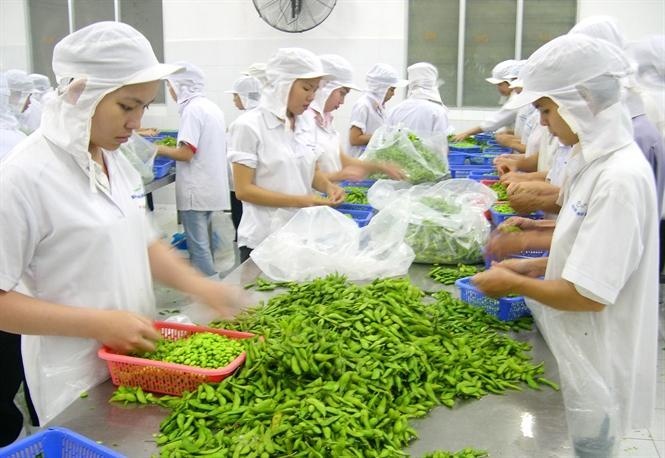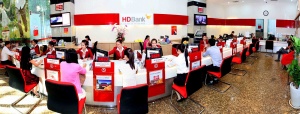Still tough times for food businesses
Le Nguyen Xuan Vu, CEO of Xuan Nguyen Group JSC, unveiled that for more than four years now, the company has not been able to access bank loans to support production, expedite factory investments, or grow.
“Our long-term plans faced a halt in 2018 due to capital access difficulties. Although we have completed 70 per cent of the work volume, several projects are still waiting for capital to procure equipment and allow us to start operation,” said Nguyen.
 |
| Businesses in agricultural production are facing multiple hardships |
This does not only affect Xuan Nguyen, many other firms in the food sector need capital advances before each season to make prepayments and build up stock amidst soaring input prices.
Nguyen Dinh Tung, chairman of Vina T&T Import Export Trading Service Co., Ltd. said, "Food companies like us all need advances to cover the cost of product purchases and help farmers expedite production."
"Sadly, as of now, both input costs and output markets cause us serious headaches as the material prices keep escalating due to the high interest rates," said Tung.
| In this situation, many firms are yearning for the central bank or their local management to craft more open policies on capital access. |
Similarly, Kao Sieu Luc, CEO of A Chau Bakery, shared that business development is not feasible as export orders are diminishing while both input materials and borrowing cost stay high.
“It is not the right time for A Chau to borrow currently. Without sound business activities, firms cannot afford to pay the interest,” Luc said frankly.
In this context, many firms have decided on not taking loans even though they are eligible, which is the case with Tran Van Son, director at Gia Bao Group JSC, based in the southern province of Binh Phuoc.
“In the past months, our firm has met business partners from Japan, South Korea, and several other countries, but could only sign about half of the contracts. Contract limitations due to unfavourable price factors have made Gia Bao particularly, and businesses in the food sector generally, quite exhausted,” said Son.
Many firms have put the blame on banks’ stringent lending requirements, as they do not accept agricultural land as collateral.
Le Nguyen Xuan Vu from Xuan Nguyen Group, commented that accepting agricultural land as collateral would pose risks to banks, but it is that safety mindset and that prudence that has closed the opportunities for many firms in the food sector.
“For over four years we have been unable to borrow, so to feed market expansion or equipment procurements, we have to transfer part of the land we have for agricultural production. To date, we have transferred 6 hectares, but we still face hurdles as our resources have almost run out,” said Vu.
In this situation, many firms are yearning for the central bank or their local management to craft more open policies on capital access.
Chairman Nguyen Dinh Tung from Vina T&T concluded, “We expect commercial lenders to push up disbursement of the 2 per cent interest subsidy package, paying greater attention to loan rescheduling to help businesses to weather the current stormy times and maintain their competitiveness in global markets.”
 | The tough proptech proposition ahead Compared to just a few years ago, the Vietnamese proptech market is now more vibrant, diverse in both quality and quantity with the participation of many different brands. But while the playground is now occupied both by traditional real estate businesses and tech companies, the risks are still apparent. |
 | Unpredictable times in real estate sector With issues persisting in terms of cash flow, real estate businesses and investors still hope various bottlenecks will be removed and a struggling market can recover by the end of 2023 |
 | Tough year expected for banks in 2023 With a dim outlook for the banking industry, most securities firms forecast that banks will post conservative profit growth in 2023. |
What the stars mean:
★ Poor ★ ★ Promising ★★★ Good ★★★★ Very good ★★★★★ Exceptional
Related Contents
Latest News
More News
- PM outlines new tasks for healthcare sector (February 25, 2026 | 16:00)
- Ho Chi Minh City launches plan for innovation and digital transformation (February 25, 2026 | 09:00)
- Vietnam sets ambitious dairy growth targets (February 24, 2026 | 18:00)
- Masan Consumer names new deputy CEO to drive foods and beverages growth (February 23, 2026 | 20:52)
- Myriad risks ahead, but ones Vietnam can confront (February 20, 2026 | 15:02)
- Vietnam making the leap into AI and semiconductors (February 20, 2026 | 09:37)
- Funding must be activated for semiconductor success (February 20, 2026 | 09:20)
- Resilience as new benchmark for smarter infrastructure (February 19, 2026 | 20:35)
- A golden time to shine within ASEAN (February 19, 2026 | 20:22)
- Vietnam’s pivotal year for advancing sustainability (February 19, 2026 | 08:44)

 Tag:
Tag:


























 Mobile Version
Mobile Version